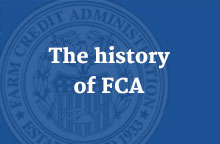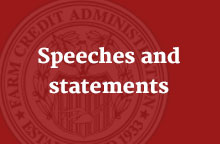
Whistleblower protections
The Farm Credit Administration Office of Inspector General is committed to providing information about prohibitions on retaliation against people who make protected disclosures of wrongdoing. This page describes the rights and remedies for those who have made, or are considering making, a protected disclosure.
-
The word “whistleblowing” is commonly used to describe the reporting of wrongdoing.
In the context of protected disclosures under the Whistleblower Protection Act, a “whistleblower” discloses information he or she reasonably believes shows any of the following:
- A violation of any law, rule, or regulation
- Gross mismanagement
- A gross waste of funds
- An abuse of authority
- A substantial and specific danger to public health or safety
- Censorship related to scientific research if censorship meets one of the above-listed categories
-
The Whistleblower Protection Act provides protection for whistleblowers, and these protections were augmented in 2012 by the Whistleblower Protection Enhancement Act.
FCA employees
Any FCA employee or applicant for an FCA position is protected against negative employment actions taken in retaliation for making protected disclosures of wrongdoing.
FCA is prohibited by federal law from taking an unfavorable personnel action against an employee in retaliation for any of the following:
- Cooperating with, or disclosing information to, the Office of Inspector General or the U.S. Office of Special Counsel
- Disclosing fraud, waste, or abuse to a supervisor
- Disclosing information required to be kept secret by law or executive order when the disclosure is made to the Office of Inspector General or the Office of Special Counsel
- Filing an appeal, complaint, or grievance
- Helping an individual file a complaint or testifying on his or her behalf
- Making a disclosure to Congress
- Refusing to obey an order that would violate a law, rule, or regulation
See the Office of Special Counsel’s publication, “Know Your Rights When Reporting Wrongs at a Government Corporation,” for more information.
For information about the rights of FCA employees and job applicants, see FCA’s EEO and diversity page.
FCA contractors
Whistleblower protections are also available to federal contractors. For more information about these protections, see 41 U.S.C. § 4712.
An FCA contractor may not be discharged, demoted, or otherwise discriminated against as a reprisal for making a protected disclosure to a person or entity listed in 41 U.S.C. § 4712(a)(2) of information that the contractor reasonably believes shows any of the following:
- Gross mismanagement of a federal contract
- Gross waste of federal funds
- Substantial and specific danger to public health or safety
- Violation of law, rule, or regulation related to a federal contract (including the competition for, or negotiation of, a contract)
- Abuse of authority relating to a federal contract
-
You may report an act of retaliation to the following offices:
- You can always contact the Office of Inspector General.
Phone: (703) 883-4316 or (800) 437-7322 toll-free
Email: [email protected]
Mail:
Farm Credit Administration
Office of Inspector General
1501 Farm Credit Drive
McLean, VA 22102-5090Note: The law does not permit an OIG employee to act as a legal representative, agent, or advocate for FCA whistleblowers. If you have questions about your specific personal circumstances, it may be advisable to seek assistance from outside counsel.
- You may also contact the Office of Special Counsel.
Submit complaints via the Office of Special Counsel website.
- To appeal an agency action, you should contact the Merit Systems Protection Board.
- If you believe you have been the victim of retaliation or reprisal for participating in Equal Employment Opportunity activities, see FCA’s EEO and diversity page on filing a discrimination complaint.
-
The Whistleblower Protection Enhancement Act of 2012 strengthens the protections for federal employees who disclose evidence of waste, fraud, or abuse. The act requires that any nondisclosure policy, form, or agreement include this statement:
These provisions are consistent with and do not supersede, conflict with, or otherwise alter the employee obligations, rights, or liabilities created by existing statute or Executive order relating to (1) classified information, (2) communications to Congress, (3) the reporting to an Inspector General or the Office of Special Counsel of a violation of any law, rule, or regulation, or mismanagement, a gross waste of funds, an abuse of authority, or a substantial and specific danger to public health or safety, or (4) any other whistleblower protection. The definitions, requirements, obligations, rights, sanctions, and liabilities created by controlling Executive orders and statutory provisions are incorporated into this [nondisclosure policy, form, or] agreement and are controlling.
Nondisclosure agreements that do not include this language may be enforced as long as agencies give employees notice of the statement.
Controlling executive orders and statutory provisions are as follows:
- Executive order no. 13526
- Section 7211 of Title 5, U.S. Code (governing disclosures to Congress)
- Section 1034 of Title 10, U.S. Code, as amended by the Military Whistleblower Protection Act (governing disclosure to Congress by members of the military)
- Section 2302(b)(8) of Title 5, U.S. Code, as amended by the Whistleblower Protection Act of 1989 and the Whistleblower Protection Enhancement Act of 2012 (governing disclosures of illegality, waste, fraud, abuse, or public health or safety threats)
- Intelligence Identities Protection Act of 1982 (50 U.S.C. 421 et seq.)
- The statutes that protect against disclosure that may compromise national security, including sections 641, 793, 794, 798, and 952 of Title 18, U.S. Code
- Section 4(b) of the Subversive Activities Control Act of 1950 (50 U.S.C. 783(b))



